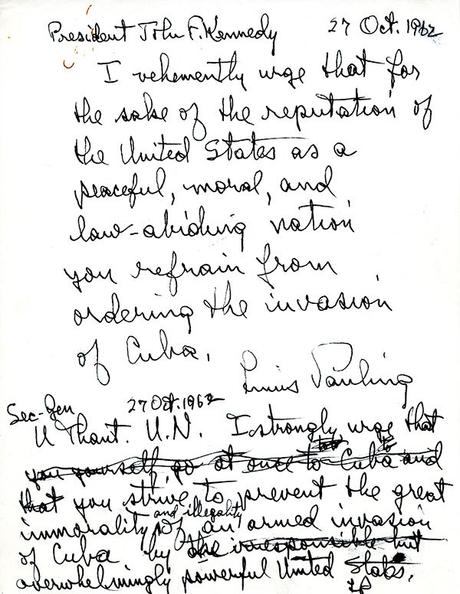 Pauling’s handwritten drafts of letters to John F. Kennedy and U Thant during the Cuban Missile Crisis, October 27, 1962
Pauling’s handwritten drafts of letters to John F. Kennedy and U Thant during the Cuban Missile Crisis, October 27, 1962[Part 3 of 4]
Though his private correspondence John F. Kennedy and Nikita Khrushchev focused primarily on matters related to nuclear testing, Linus Pauling also initiated conversations with the two leaders on several other issues.
As with many Americans, Pauling was deeply concerned by the Cuban Missile Crisis and also expressed alarm at the way that American communists were being treated. So too was Pauling troubled by the treatment of the Jewish population in the Soviet Union, as evidenced in his letters to the Soviet Premier. These “remainder” topics from the Pauling correspondence with these two crucial figures is the subject of today’s post.
In October 1962, during the height of the Cuban Missile Crisis, Pauling sent a letter of admonishment to the American President. In it, Pauling wrote that he believed that the mere “threat of military action” was liable to create a Soviet “retaliation by nuclear attack,” a reaction that would put all Americans in “grave danger of death through nuclear war.”
One week letter, Pauling drafted by hand an even more forceful letter to Kennedy, in which he “vehemently urge[d] that for the sake of the reputation of the United States as a peaceful, moral, and law-abiding nation, you refrain from ordering the invasion of Cuba.” Notably, on the same piece of paper, Pauling also penned a draft letter to the Secretary General of the United Nations urging him to use his powers to prevent the “great immorality and illegality of an armed invasion of Cuba.”
Earlier that same year, Pauling wrote a different letter to Kennedy urging him to pardon the leader of the Communist Party of the United States, Junius Scales, who had been imprisoned. Pauling argued that Scales’ incarceration was unjust and that his sentencing had weakened the First Amendment of the Constitution. Kennedy offered no reply of consequence – an assistant responded that the President was “glad to have the benefit” of Pauling’s views on the case – but did ultimately commute Scales’ sentence in late 1962.
In addition to issues of nuclear testing and disarmament, Pauling pressed Nikita Khrushchev on the treatment of Jews within the Soviet Union. This communication was prompted by a letter on the topic that Pauling received in early 1963 from his friend, Bertrand Russell, the noted mathematician, philosopher and human rights advocate.
After corresponding with Russell several times to get his input, Pauling finally sent his letter to Khruschev in late 1963. In it, he outlined allegations of imprisonment (and even execution) of Jews for practicing their religion, and attempted to appeal to Khrushchev’s humanity in pushing for change. In doing so, Pauling stressed that his appeal was “one of concern and not of condemnation,” and that a “true test of friendship is the ability to speak frankly without fear of being taken for enemies, or of being misunderstood.” While it does not appear that Khrushchev issued a reply, the number of preliminary drafts that Pauling authored, and the thought that he devoted in approaching the matter, indicate the extent to which the issue was important to Pauling.
Pauling’s private relationship with Kennedy and Khruschev was in many ways quite similar. Pauling condemned both men for their roles in continuing their country’s nuclear testing program, and he held both accountable in bringing the programs to an end. And though his approach to non-nuclear issues with the two men differed a bit, he felt consistently emboldened to take a direct path in expressing his concerns.
In his public relationship with these two individuals, Pauling’s approach at times bordered on the theatrical. Pauling wanted action to be taken, and he knew that the best way to achieve that was to be bold and to make people notice. Our next post will explore this in greater detail.
